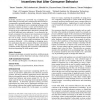Free Online Productivity Tools
i2Speak
i2Symbol
i2OCR
iTex2Img
iWeb2Print
iWeb2Shot
i2Type
iPdf2Split
iPdf2Merge
i2Bopomofo
i2Arabic
i2Style
i2Image
i2PDF
iLatex2Rtf
Sci2ools
HUC
2009
Springer
2009
Springer
Applying pervasive technologies to create economic incentives that alter consumer behavior
Economic incentives are a powerful way of shaping consumer behavior towards more commercially efficient and environmentally sustainable patterns. In this paper, we explore the idea of combining pervasive computing techniques with electronic payment systems to create activity-based microincentives. Users who consume additional resources by e.g., occupying an air-conditioned space instead of a normal space are levied additional micro-payments. In an alternative approach, consumers who choose to save resources are rewarded with micro-rebates off the price of a service. As a result, the cost of using a service corresponds more closely with the resources used, leading market mechanisms to allocate resources efficiently. A key challenge is designing incentive mechanisms that alter consumer behavior in the desired fashion. We introduce four incentive models, and present evaluation results suggesting that consumers make different decisions depending on which model is used. Author Keywords P...
Consumer Behavior | Economic Incentives | HUC 2009 | Human Computer Interaction | Pervasive Computing Techniques |
| Added | 25 Jul 2010 |
| Updated | 25 Jul 2010 |
| Type | Conference |
| Year | 2009 |
| Where | HUC |
| Authors | Tetsuo Yamabe, Vili Lehdonvirta, Hitoshi Ito, Hayuru Soma, Hiroaki Kimura, Tatsuo Nakajima |
Comments (0)

